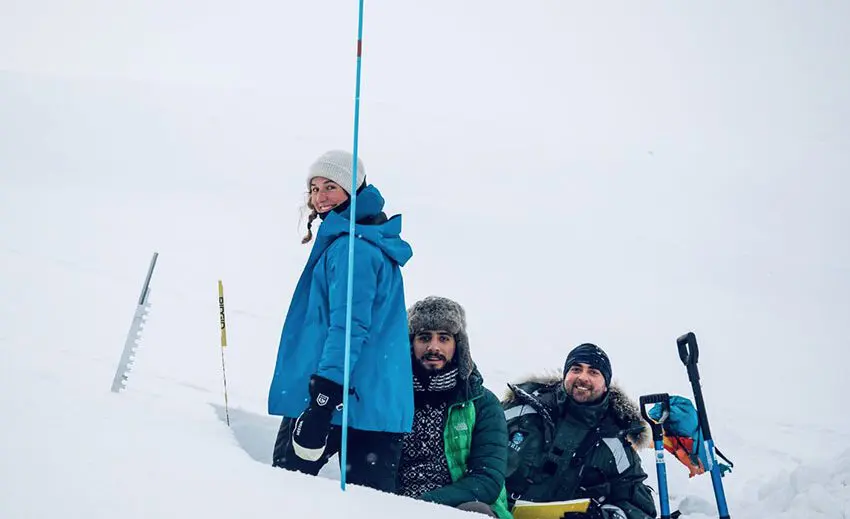Small classes, big learning opportunities

Ronja Aarum digging a snow sample. Photo: Private
Top image: Out in the field with fellow classmates. Ronja Arum spent two semesters at UNIS, and have plans to come back. Photo: Private.
Ronja Arum visited Svalbard a couple of years ago and was immediately struck by its beauty. “I need to come back here,” she thought. After starting geology at NTNU she realized she could spend a whole year up north as part of her studies.
13 April, 2021
Text: Maria Philippa Rossi
“I was thrilled! I spent the autumn of 2019 and spring 2020 in Svalbard.”
When the first Covid-19-lock-down hit Longyearbyen in March 2020 the university closed, and students were urged to return home.
“I stayed, as I had no place to live in Trondheim, and it was a natural choice to stay. I spent the summer working as a field assistant for several master students and post docs, and I’m still part of a research project, a possibility I got because I didn’t leave the island.”

Making the most out of Covid-19
“Despite the challenges of lock-down I think UNIS did the most out of it, and they adapted well to the online teaching system. In AG-222 there’s a lot of focus of how to portray geological data in different ways. We’d already been introduced to virtual fieldtrips and continued to “visit” the places where we should have been in real life. Of course, I prefer being out in the field, but we made it work with the restrictions in place.”
Ronja explains that one of her favourite things about UNIS is the small classes.
“At the big universities you’re one of 200 students. At UNIS, you can get involved in a different way. You work and communicate with people who are so passionate about their research, it’s very inspiring.”
The courses have high focus on group work where the students work together in smaller groups.
“We had a lot of freedom to develop our group work. We made our own project, planned and conducted fieldwork on our own. In Svalbard, you have some extra aspects that has to be taken into consideration: polar bears, cold, security.”
“When things go haywire, well, they go haywire, but it’s an invaluable experience to bring a long in future studies and work life.”
Varied student life
She tells of a varied study day with field work, collecting and analyzing data.
“The daily life at university is very varied, and changes from week to week. There’s a big focus on practical learning which suits me well,” she says.
“You need to be ready for new experiences! There are new impressions all the time, but that’s what makes it fun and exciting!”
Ronja says that a normal day consisted of school during the morning and midday, and normally a hike or ski trip in the afternoon.
“It was probably my best year of studies,” she says enthusiastic.
“It was also the year where I learnt the most because everything in and out of school was some kind of learning.”

Planned return to Svalbard
She is about to start a master in geology and plans for another semester on Svalbard.
“I haven’t landed my research project yet, but I’m talking to my professors about what to study in order to spend as much time as possible in Svalbard.”
In order to enjoy a semester at UNIS, Ronja recommends that you prepare for the impression overload.
“There’s so much that happens! I recommend finding a group of people you feel safe with, and that you trust when going out in the wilderness. If you’re spending the spring semester in Svalbard, get a snowmobile! It gives you so much freedom!”
She adds that the beauty of Longyearbyen is that there are many activity options close to town, and there’s no need to cross Spitsbergen to have great outdoor experiences.
“With the training you get in the safety course, everyone has a minimum level of knowledge about how to travel safely around. And if you’re not eager to spend time outdoors, lots of things are happening in town as well!”
Read more about the Arctic geology courses at UNIS and apply before 15 October, 2021.
